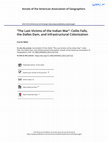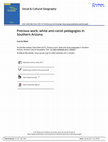Papers by Carrie Mott
Journal of Geography, 2024
Undergraduate research with historical archives offers an engaged and rewarding way to expose stu... more Undergraduate research with historical archives offers an engaged and rewarding way to expose students to historical geographic research methods. In combination with an antiracist pedagogical approach, students' archival research provides pathways to better understand the racialized history of a place through a process that most find enjoyable. In this article, the author shares her experience teaching a geography course focused on local racial history in Louisville, Kentucky (United States) and discusses the types of archives-based assignments students complete. In addition, this article presents strategies that geographic educators could take to incorporate archival materials into their own courses.

Annals of the American Association of Geographers, 2023
In 1957, the Dalles Dam was constructed on the Columbia River between Washington and Oregon. When... more In 1957, the Dalles Dam was constructed on the Columbia River between Washington and Oregon. When the dam was completed, it inundated Celilo Falls, a Native American fishery and cultural gathering point that had been in use for at least 12,000 years. Prior to dam construction, the federal government and local agencies issued a number of reports stating the necessity of the dam for economic development through hydroelectric power generation, improved shipping navigation, flood control, and expanded irrigation capacity. These reports often sought to determine the financial payout that would be made to the groups with treaty rights to fish at their "usual and accustomed" places, such as Celilo Falls. However, the reports rarely engage with the cultural significance of Celilo Falls or the depth of opposition that people had to the dam. The research discussed here is based on archival government reports alongside the voices of affected tribal members preserved through The Confluence Project and other sources. This article develops the idea that reclamation infrastructure in the U.S. West plays a key role in colonizing efforts from federal to local scales, reflecting the aims of the settler state. Through an analysis of government documents alongside the recollections of Indigenous elders from the mid-Columbia region, this article offers insights into how reclamation infrastructure functions as an aspect of settler colonialism and relies on theorizations of this process from the people most affected by the loss of Celilo Falls.

Environment and Planning E: Nature and Space, 2022
This paper explores the process of settler colonialism in Washington State's Yakima Valley in the... more This paper explores the process of settler colonialism in Washington State's Yakima Valley in the early twentieth century as an example of a regional power bloc that sought to maximize white access to natural resources while dispossessing Native Americans of their lands and access to water. Through a multiscalar approach, I consider how colonization and white supremacy were normalized through infrastructural projects crucial to agricultural development and economic prosperity in the US West A discussion of a 1906 Native American grave robbery operates as an anchor for a larger analysis of how irrigation infrastructure and other reclamation projects served the colonizing aims of the US federal government. In the US West, the Bureau of Indian Affairs (BIA) and Bureau of Reclamation (BoR) were both federal agencies that played critical roles in an era where public lands were being converted to private property and allotted Native American reservation land was significantly diminished after being sold to non-Natives. The grave robbery itself and ensuing trial serve as indications of everyday life in the Yakima Valley in 1906, revealing the interconnections between infrastructural advancements, white supremacist settler colonialism, and grave robbery.
Handbook for Teaching and Learning in Geography, eds Helen Walkington, Jennifer Hill, Sarah Dyer, 2019

Gender, Place, and Culture, 2020
Racism, sexism, and homophobia have long been characteristic of liberal democracy in North Americ... more Racism, sexism, and homophobia have long been characteristic of liberal democracy in North America. Public discussion around harassment -with a particular focus on sexual violence against women -reached its ferment in the light of charges brought against a number of high-profile public figures and with the #MeToo movement. Within the academy, radical, feminist, and anti-racist scholars have recently faced targeted harassment and threats of violence through email campaigns organized online by right-wing and white supremacist online. Many have pointed to the specificity of the digital medium as facilitating new forms of harassment online. Yet, others have shown how digital spaces might be better seen in continuity with older forms of violence, that have long targeted communities of color working to challenge racist systems of oppression. We contribute to this line of thinking by examining a case of white supremacist violence against a Black family -the Wades -who purchased a home in a predominantly white neighbourhood in Louisville, Kentucky in the 1950s. With attention to both Black and digital geographies, we juxtapose the Wade's story with critical work on newer forms of white supremacy online. We show how hatred persists alongside shifts in medium, and question the extent to which digital platforms create new opportunities for harassment and violence.
This commentary explores some of the threads developed by the editors of Dialogues in Human Geogr... more This commentary explores some of the threads developed by the editors of Dialogues in Human Geography in light of the recent publication and online conversation surrounding our article, 'Citation Matters'. We examine the precariousness of academic speech, question when it's necessary to conscientiously disengage from dialogue, and posit whiteness as a limit of and condition for dialogue. We frame this around the claim, building further on Mouffe's concept of agonism, that different speech acts, in particular within spheres like the academy, and especially in the absence of a clear foundation for dialogue, can be viewed from a point of view of nonequivalence.

Social & Cultural Geography , 2017
Social justice activists come to Southern Arizona to involve themselves in humanitarian aid proje... more Social justice activists come to Southern Arizona to involve themselves in humanitarian aid projects that address human rights issues emerging from border securitization processes. Over time, many of these activists connect with other social justice projects, leading to the existence of rich and dedicated networks of activists in Tucson, Southern Arizona's largest city. Subsequently, we see the development of activist ventures orienting themselves around racial justice, through which white people work to educate other whites about white supremacist society. This paper explores the ways that white activists negotiate whiteness and privilege within Tucson's activist networks by employing deliberately anti-racist critical pedagogies. Through excerpts from interviews and reflections on experiences as a participant observer from 2013 to 2015, I discuss the figure of the white anti-racist activist. In particular, I examine the paradoxical process of becoming anti-racist, through which white activists work to address problematic aspects of their own and others' socialization as white subjects within the hierarchy of white supremacist society, a process that necessarily coexists with the knowledge that one cannot 'unwhiten' oneself, and many problematic behaviors remain.
a department of Geography, rutgers, the State university of new Jersey, new Brunswick, nJ, uSa; b... more a department of Geography, rutgers, the State university of new Jersey, new Brunswick, nJ, uSa; b department of Geography and environmental Management, university of Waterloo, Waterloo, On, canada ABSTRACT
An annotated bibliography of feminist geography, published in Oxford University Press' series of ... more An annotated bibliography of feminist geography, published in Oxford University Press' series of online annotated bibliographies (subscription only).
The neoliberalization of university education requires transformative approaches to teaching and ... more The neoliberalization of university education requires transformative approaches to teaching and learning. This article, which emerged out of a panel on critical pedagogy at the 2013 Association of American Geographers annual meeting in Los Angeles, brings together four contributed ‘tales’ that demonstrate how pedagogy-as-resistance opens up political possibilities both inside and outside of the higher education classroom. Drawing upon key themes within the tales, we explore possible strategies to intervene in and disrupt various forms of oppression that play out through the neoliberalization of higher education. We suggest that geographers should contest, rather than accommodate, the encroachment of neoliberalism into our classrooms. This article concludes with a discussion of the benefits of incorporating a caring and critical pedagogy into higher education.

Antipode, 2016
Interpersonal conflict poses a serious threat to social justice activism. In the context of indig... more Interpersonal conflict poses a serious threat to social justice activism. In the context of indigenous solidarity activism in southern Arizona, conflicts are often born of the challenges accompanying differentials in social privilege due to differences in race and ethnicity relative to white supremacist settler colonialism. This paper examines activist collaboration between Tohono O'odham and non-Native anarchist activists in southern Arizona, arguing that a topological activist polis is a useful lens through which we can better understand the roots of conflict in social justice activism. Non-Native activists are often aware of the ways white supremacist settler colonial society privileges particular identities while marginalizing others. Nonetheless, settler and white privilege give rise to tensions which can be seen topologically through the very different relationships non-Native and indigenous activists have to ongoing processes of white supremacy and to histories of the genocide of indigenous peoples.
Arizona Anthropologist, 2015
Antipode, 2014
In our paper, 'Not everyone has (the) balls: Urban exploration and the persistence of masculinist... more In our paper, 'Not everyone has (the) balls: Urban exploration and the persistence of masculinist geography', we offered our critical reflections on the ways urban exploration has been treated by human geographers. We observed that the geographic literature on urban exploration did not, for the most part, question "dominant presentations of exploring bodies found in wider urbex discourse" (Mott and Roberts 2013: 6). We paid particular attention to the ways that geographic scholarship on urban exploration largely avoided addressing the prevalent masculinism of the practice, even as urban exploration is touted as a way of radically reappropriating urban space toward politically progressive ends.
Antipode Online, 2013
In geographic scholarship, urban exploration (urbex) has been examined as an embodied practice wi... more In geographic scholarship, urban exploration (urbex) has been examined as an embodied practice with radical potential for re-appropriating urban spaces. However, geographic literature on urban exploration has largely ignored the particular qualities of the urban explorer as a subject and neglected feminist scholarship on embodiment and social difference. Based on our examination of both popular and academic treatments of urbex we identify a prevalent and largely unacknowledged culture of masculinism. We ask: Whose bodies explore? What counts as experience? What constitutes the exchange between body and place? And, with what effects? Addressing these questions permits considerations of exclusions and marginalizations left unaddressed in much geographic literature on urbex.
Book Reviews by Carrie Mott
Commentary from the 2017 American Association of Geographers Conference in Boston from an author-... more Commentary from the 2017 American Association of Geographers Conference in Boston from an author-meets-critics panel on Simon Springer's The Anarchist Roots of Geography.
Video by Carrie Mott










Uploads
Papers by Carrie Mott
Book Reviews by Carrie Mott
Video by Carrie Mott